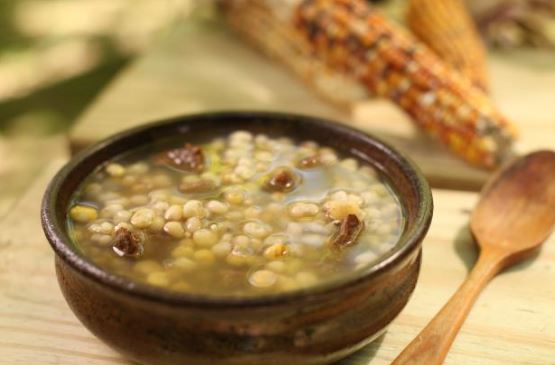Hominy Corn Soup
Ingredients:
3/4 pound pork loin chops, cubed (save the bones for the soup as well)
2 15.5 oz cans hominy, drained and rinsed
3 medium-sized potatoes, peeled and diced
1 15.5 oz cans kidney beans, drained and rinsed
Salt and pepper
Directions:
- In a large deep pot of salted water, bring the meat (and bones, if using) to a boil. Cook at a gentle boil for 45 minutes. This creates a flavorful broth.
Add the hominy to the pot gently boil for another 45 minutes. In the meantime, boil the diced potatoes in a separate pot until fork tender, drain and cool to stop the cooking process.
Add the cooled potatoes and beans to the soup mixture. Add up to 2 C of water to the soup until it is your desired consistency.
Variations: Pork hocks, salt pork can be used. Omit or limit salt. You can also use chicken thighs and substitute stock instead of water.
Story:
First the chemistry, then the history and culture of hominy. Hominy is processed corn loved for its puffy, slightly chewy kernels. Hominy is the result of a long cooking process in which the mature dried flint (field) corn kernels are cooked with wood ash (aka lye) causing a chemical reaction called nixtamalization. A solution of lye (potassium hydroxide - which can be produced from water and wood ash) or of slaked lime (calcium hydroxide from limestone) is the first step. Next the husked are removed from the grains, rinsed and cooked again. Soaking the corn in lye kills the seed's germs, which keeps it from sprouting while in storage. Finally, in addition to providing a source of dietary calcium, the lye or lime reacts with the corn so that the nutrient niacin (B3) can be assimilated by the digestive tract. People consume hominy in intact kernels, grind it into sand-sized particles for grits, or into flour.
This food and the process that allows it to be stored for years has been vital to the health and food culture of middle America. It honors their commitment to 7 generations. Many tribes strive to have a 3 year supply of dried corn on hand in case of drought or other hardship. Traders brought maize/corn along all their routes and today, it is often bartered and rarely sold.
Corn is a sacred food and bringing it from seed to table is a sacred process. Ceremonies using tobacco, drumming, songs, chants and blessings are a part of all involved. It is done with gratitude for the whole community. To see for yourself, watch the following videos showing Native people working with corn.
PBS Wisconsin: Wisconsin Foodie
Travel with Wisconsin Foodie to the Oneida Reservation outside of Green Bay, WI to meet Laura Manthe and Rebecca Webster, cousins and members of the Oneida Nation. They are part of a White Corn Growers Cooperative and are revitalizing an ancient heirloom food within the Oneida Nation, White Corn. You’ll notice their values, hard work and passion. Host Luke Zahn gets a personal tutorial on how to prepare White Corn Soup. “It is more than eating a bowl of soup. It feels like you are being woven into a very large story, a very beautiful story.” Watch it here: pbswisconsin.org.
CBS Docs: Stories from the Land
An Oneida chef and a knowledge keeper guide you through the traditional way of making Corn Soup. As we learn about the soup and how it’s made, we also learn about how the process is deeply rooted in the culture. From the way the corn is harvested, to the way hardwood ashes are used as part of the process, to the way the soup is distributed to the elders of the community as an acknowledgment of the work they do. All from a humble bowl of corn soup. Watch it here: youtube.com.
If you would like to be notified when we share new recipes, be sure to scroll to the bottom, provide your email address, check the box confirming you are not a robot, click on a few photos to prove it and click subscribe! You will then receive an email after each new post. Remember, we're always looking for new recipes, so keep sending them to ecopact@fspa.org!





Post a Comment